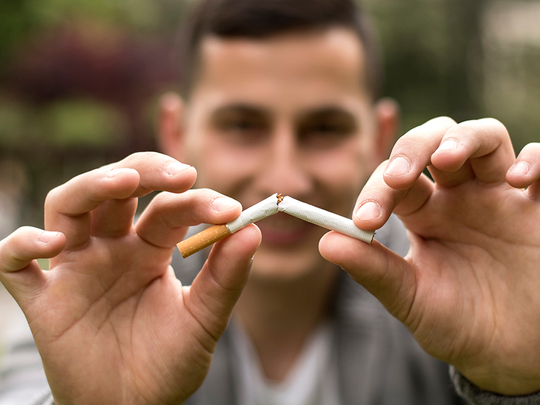
Experts from the Dubai Health Authority’s (DHA) Cessation Clinics called on smokers to stub the habit before tobacco use takes a life-threatening toll on their health.
On average 300 smokers visit DHA’s cessation clinics each month. The clinics are located in Al Barsha and Twar Health Centers and have succeeded in increasing the number of patients who stop smoking by 16 per cent.
reacting late
However, the worry is that people do not take preventive measures and most of those who register with the cessation clinic are those who have already suffered the ill-health effects of tobacco cessation.
“The majority of patients that visited the DHA’s cessation clinics tried to stub the habit only after tobacco use took a life-threatening toll on their health. Most of them came to us only after they experienced first-hand the health repercussions of tobacco. Smokers are referred to us after they suffer a heart attack or stroke or another chronic disease that is triggered by tobacco. While this reflects the strong referral system that we have in place, it is also highly unfortunate that people only think of quitting after they have suffered the dire health consequences of tobacco use,” said Dr Hanan Obaid, Head of Acute & Chronic Diseases Unit at DHA’s Primary Health Care Sector.
Those who suffer from the health consequences of smoking are mainly young adults and this is one of the reasons DHA has further strengthened its smoking cessation services.
Dr Obaid said, “The patients we see are from the age group of 15 years to 50 years, but most are in the age group of 25 to 45 years and it’s really unfortunate that they have already gone through so much in terms of their health. At the centres, we provide a holistic approach to help smokers stub the habit. Tobacco dependence is a behavioural, cognitive and physiological phenomenon and therefore we provide medical, psychological and social support. The clinic reaches out to smokers to help them cope with nicotine withdrawal symptoms which is a factor that often dissuades them from stubbing the habit.”
According to Dr Obaid, smokers need most support when they experience symptoms, which can include nervousness, irritability, headaches, insomnia and fatigue.
One-time package
To help them successfully quit tobacco requires follow-up and a long-term plan and therefore the centres offer a one-time package for patients. “We have developed a smoking cessation package so that smokers who visit the cessation clinic receive all aspects of medical care to help them stub the habit,” says Dr Obaid. “The package includes blood investigations, ECG and a Smokerlyzer test to measure the levels of toxic carbon monoxide (CO) inhaled from tobacco smoke. The clinics also provide medical and psychological support to smokers and offers four consultations as part of the package.”
Dr Obaid said smokers who quit can begin to experience the immediate health benefits of tobacco cessation. “Tobacco smoke is a mix of more than 4,000 chemicals, of which 250 are toxic and at least 50 are known to cause cancer. People who quit smoking have a lower risk of lung cancer but their risk is higher than the risk of people who never smoked. Yet, it is important to note that quitting tobacco at any age can lower the risk of cancer and other chronic diseases.”
Dr Obaid added that smokers should be considerate about their friends and family members, especially children and pregnant women. Passive smoking is harmful, especially for small children still in the developmental stages of their life. According to WHO, almost half the children in the world, regularly breathe air polluted by tobacco smoke in public places.
Dr Obaid said, “As a smoking-cessation specialist, my message to smokers is to think about themselves and their family members. Almost 95 per cent of smokers that come to our centre are men who are fathers and husbands and have a responsibility towards their family and especially their young children.”











